Part I COVID-19 Pandemic and Japan’s Efforts
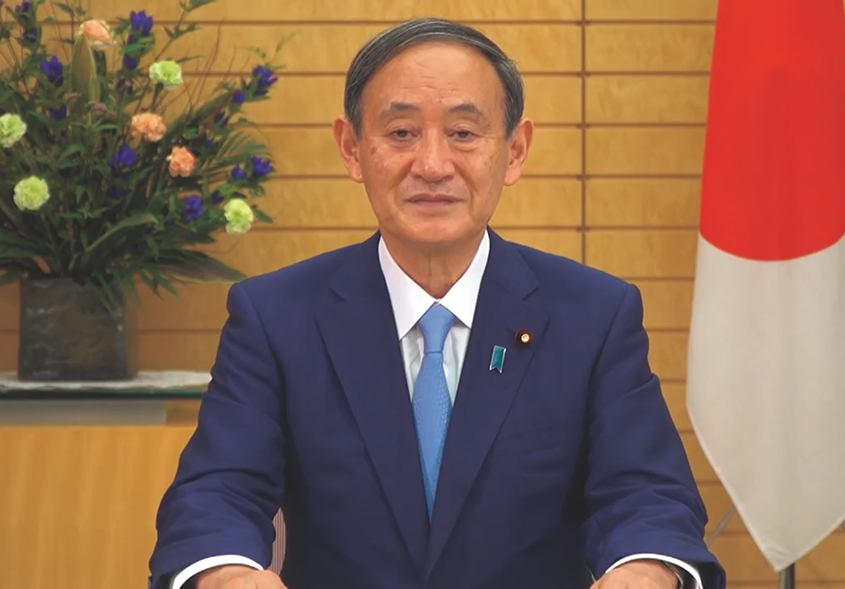
Prime Minister SUGA Yoshihide delivering a statement at the General Debate of the 75th session of the United Nations General Assembly (September 26, 2020) (Photo: Cabinet Public Affairs Office of the Government of Japan)
1. Human Security Crisis and Japan’s Response
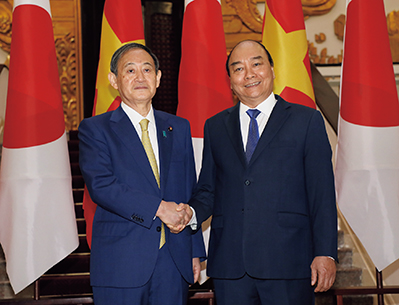
Prime Minister Suga visiting Viet Nam on his first overseas trip since taking office (October 2020) (Photo: Cabinet Public Affairs Office of the Government of Japan)
The year of 2020 was a year that the Novel Coronavirus (COVID-19) pandemic significantly affected the entire world. The spread of COVID-19 had a serious impact on the lives and livelihoods of all people on earth, regardless of race, ethnicity, religion, culture, and whether they are from developed or developing countries. It is a human security crisis that threatens people’s survival, livelihood, and dignity. The pandemic demands an ever more coordinated response by the international community to ensure that no one is left behind, based on the concept of human security, which Japan has long promoted. Under this concept, Japan promotes the following comprehensive efforts to achieve Universal Health Coverage (UHC): (i) overcoming the current COVID-19 crisis; (ii) strengthening health and medical systems against future health crises; and (iii) generating an enabling environment for health security across broader sectors. To this end, Japan extended assistance at an unprecedented speed, providing over ¥170 billion in assistance to health and medical sectors of countries with fragile health and medical systems and establishing the COVID-19 Crisis Response Emergency Support Loan, which provides up to ¥500 billion over two years to bolster economic activities in developing countries mainly in the Asia-Pacific region.
(1) Japan’s Efforts
A. Bilateral Assistance
Firstly, as bilateral assistance in response to COVID-19, Japan decided to provide health and medical equipment through grant aid amounting to ¥48 billion to developing countries for the purpose of supporting their health and medical systems. Upon consulting with each government about needs for equipment to strengthen their health and medical systems for the medium to long-term, equipment such as X-ray imaging equipment, thermography cameras, and ambulances have arrived and are being utilized in recipient countries since the end of July 2020. In addition, Japan provided a total of ¥1.5 billion in new technical cooperation for capacity building assistance, including human resources development, to strengthen health and medical systems for the medium to long-term. Some of the technical cooperation projects which were already under way, in collaboration with local counterpart organizations, provided assistance for system improvement including trainings on protection against infection among healthcare workers and on prevention of in-facility infection, as well as provision of medical supplies and equipment (see “Measures Against the COVID-19 Pandemic” for specific cases of grant aid, etc. implemented in 2020 and see page 14, “ODA Topics,” regarding the ASEAN Centre for Public Health Emergencies and Emerging Diseases).
In April 2020, Japan decided to extend Emergency Grant Aid for supplying Avigan tablets to countries experiencing COVID-19 outbreaks and provided the tablets to 45 countries by December 31, 2020.
As the pandemic has dealt a catastrophic economic blow to many countries, the Government of Japan established the COVID-19 Crisis Response Emergency Support Loan to provide up to ¥500 billion over the course of two years to support the maintenance and revitalization of economic activities in developing countries. As of December 1, 2020, Japan expeditiously provided funds for implementing necessary economic measures mainly to developing countries in the Asia-Pacific, such as the Philippines, Indonesia, Bangladesh, India, and the Maldives. Japan will continue to provide not only short-term assistance but also medium and long-term support to help developing countries build resilient health and medical systems and maintain and revitalize their economic activities.
B. Assistance through International Organizations
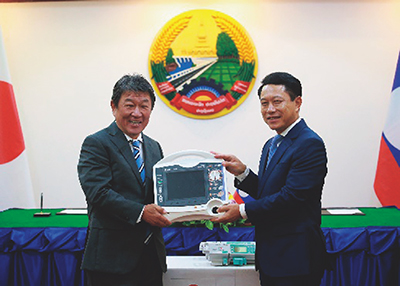
Foreign Minister Motegi and Foreign Minister Saleumxay at the handover ceremony for health and medical equipment provided to Laos under the Economic and Social Development Programme, a grant aid program on which notes were exchanged in June 2020 (August 2020)
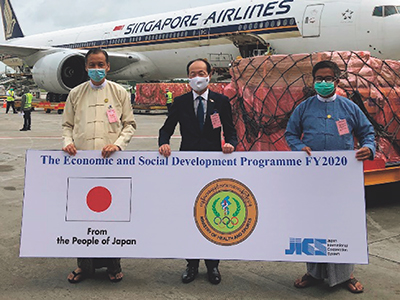
Medical equipment handover ceremony in Myanmar (August 2020)
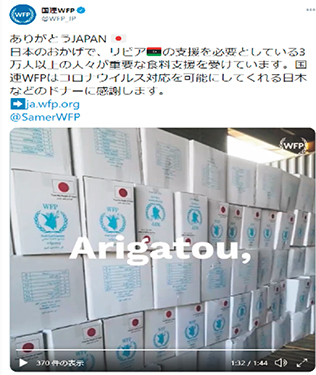
In June 2020, relief supplies (e.g., pasta and flour) marked with the Japanese flag arrived at the port of Tripoli in Libya. The WFP Libya office circulated a Twitter video Note 2 showing WFP staff distributing food throughout Libya, along with a message of gratitude to Japan.
Secondly, Japan has provided COVID-19 related assistance through international organizations. By the end of March 2020, Japan contributed $140 million and implemented emergency assistance through five United Nations (UN) agencies, including the World Health Organization (WHO) and the United Nations Children’s Fund (UNICEF), and the International Federation of Red Cross and Red Crescent Societies (IFRC). In addition, Japan provided assistance through international organizations, including UN agencies and multilateral development banks (MDBs) Note 1 that provide emergency assistance in developing countries, and through multilateral funds, such as the Global Fund to Fight AIDS, Tuberculosis, and Malaria (Global Fund); Gavi, the Vaccine Alliance; and Unitaid, to prevent the spread of infection, improve healthcare delivery systems, and ensure equitable access to vaccines, therapeutics, and diagnostics (see E. regarding global efforts for vaccine development and distribution, the glossary regarding the Global Fund and Gavi, and “Japanese Personnel Playing Active Roles in International Organizations across the World” regarding the activities of Japanese staff at Gavi).
In assistance through international organizations, it is possible to provide the necessary assistance quickly, including to countries and regions where bilateral assistance is difficult to reach, by collaborating with those organizations that have expertise and achievements in their respective fields. For example, the social and economic impacts of the COVID-19 pandemic have led to a significant increase in the starving population in the world. Therefore, Japan provided food assistance in Africa, the Middle East, and Asia through contributing funds to the United Nations World Food Programme (WFP), which espouses the slogan, “Until the day we have a medical vaccine, food is the best vaccine against chaos” (see “Japanese Personnel Playing Active Roles in International Organizations across the World” regarding the activities of Japanese staff at WFP and Efforts to Provide Food Assistance and Improve Nutrition regarding Japanese assistance through WFP).
Through UNICEF, Japan provided technical assistance on infection prevention to health workers and local government officials mainly in Asia and Oceania, Africa, and the Middle East, along with distribution of disinfectants, soaps, and others. In Kenya and Tanzania, collaborating with Japanese companies, it helped to install easy-to-build toilets and provide hygiene guidance. Through the United Nations High Commissioner for Refugees (UNHCR), Japan supported refugees, displaced persons, and other people in 17 countries in Asia and the Middle East, including the camps of Cox’s Bazar in Bangladesh. Through the United Nations Relief and Works Agency for Palestine Refugees in the Near East (UNRWA), Japan provided support to clinics for Palestinian refugees for the prevention of infectious diseases (see the column “Stories from the Field” regarding Japan’s assistance through UNHCR).
Furthermore, the International Finance Corporation (IFC), a member of the World Bank Group, launched the Global Health Platform to stimulate private-sector investment in the production and supply of health and medical goods, including COVID-19 vaccines and therapeutics. Japan announced it will support the establishment of Platform projects and technical assistance for the private sector in developing countries through contributing funds to the IFC.
C. Assistance by NGOs
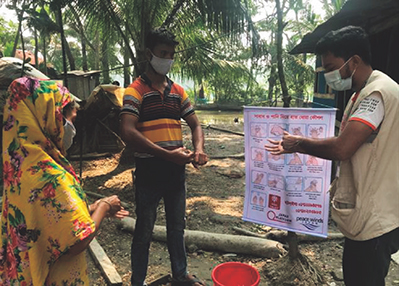
Awareness raising on handwashing to prevent infectious diseases in Bagerhat District, Bangladesh (Photo: Peace Winds Japan)
Japanese NGOs also have provided a variety of assistance to help combat infectious diseases funded by ODA. In the Grant Assistance for Japanese NGO Projects, Japanese NGOs provided hygiene products, such as masks and disinfectants, to people involved in the projects, and supported various training and awareness raising programs for COVID-19 prevention. The Japan Platform (JPF) launched the COVID-19 Emergency Response program and provided assistance for surveillance, prevention, and treatment in affected countries, including those struck by natural disasters during the COVID-19 pandemic. For example, in southern Bangladesh battling COVID-19 and the aftermath of Cyclone Amphan that struck in late May 2020, JPF provided emergency humanitarian assistance to help prevent COVID-19 to affected people, including through COVID-19 awareness raising and distribution of soaps and masks in affected communities (see also “Support for Refugees and Displaced Persons” and “Japan Platform (JPF)” regarding JPF).
D. Response of International Community and Other Countries’ Efforts
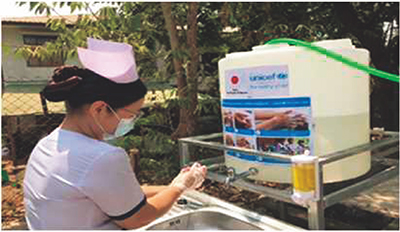
UNICEF’s handwashing support in Myanmar
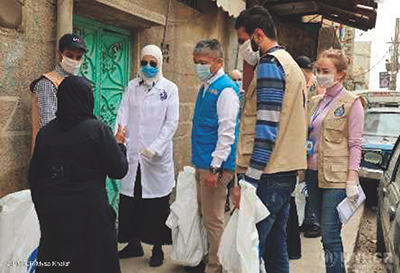
UNHCR Representative to Syria Ito (center) distributing hygiene products to residents
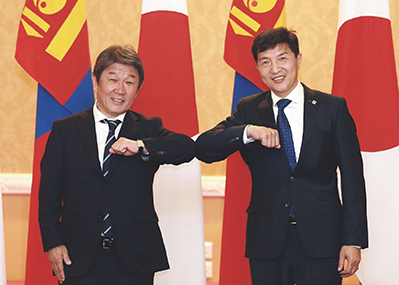
Foreign Minister Motegi visiting Mongolia and holding a meeting with his counterpart, Foreign Minister Enkhtaivan (October 2020)
In response to the spread of COVID-19, the UN announced the Global Humanitarian Response Plan (GHRP) for COVID-19 in March for developing countries with fragile medical systems. The GHRP appealed for $2 billion (revised to $10.3 billion in July) for vulnerable countries and regions from April to December 2020.
In May, the European Union (EU) hosted the Coronavirus Global Response event, a summit meeting to raise funding for developing vaccines, therapeutics, and diagnostics and for ensuring equitable access to them. In addition to the host EU, the heads of State and Government of approximately 30 countries, including Japan, Canada, France, Germany, Italy, Norway, Saudi Arabia, Spain, and the United Kingdom, as well as approximately ten ministers, the UN Secretary-General, heads of other international organizations such as WHO, and representatives of civil society and companies such as the World Economic Forum and the Bill & Melinda Gates Foundation attended or delivered video messages. From Japan, then Prime Minister ABE Shinzo participated via video message. He underscored that Japan was promoting the development of therapeutics and vaccines both domestically and internationally, that equitable access to such therapeutics and vaccines was important, and that Japan was expanding its support to developing countries with fragile medical infrastructure for strengthening their health systems, and pledged that Japan would make a reasonable contribution in these areas.
At the G20, the first G20 Summit Video Teleconference, which was called for and hosted by the Saudi Arabia Presidency, was held in March, and leaders discussed the economic situation of their countries and measures to prevent the spread of infection. In addition, G20 Finance Ministers and Central Bank Governors held video conferences in March, April, July, October, and November, and a G20 Joint Finance and Health Ministers Virtual Meeting was held in September. These meetings discussed international measures to support the global economic recovery and infection prevention and compiled the G20 Action Plan and its updated version. Japan pointed out that overcoming COVID-19 requires not only developing vaccines and therapeutics but also mass-producing and distributing them worldwide, including developing countries. As part of this effort, Japan proposed creating a patent pool as a mechanism to expedite the licensing of therapeutic patents. In response to Japan’s proposal, the updated version of the G20 Action Plan endorsed comprehensive efforts to develop, manufacture, and distribute vaccines and therapeutics and the creation of a patent pool (voluntary licensing of intellectual property) and confirmed the importance of UHC financing. Furthermore, COVID-19 response and recovery were discussed at ministerial meetings of trade and investment, energy, and agriculture and at various working groups.
At the G20 Riyadh Summit in November, Prime Minister Suga stated that in the COVID-19 response, it was important to have a multilateral cooperation framework for securing equitable access to therapeutics, vaccines, and diagnostics and to reach a G20 agreement on endorsing patent pooling. He also described Japan’s active role in promoting multilateral cooperation through becoming an original member to launch the ACT Accelerator and supporting the COVID-19 Vaccine Global Access Facility (COVAX Facility) (see also the glossary regarding the COVAX Facility and E. below regarding global efforts for the development and distribution of vaccines).
The G7 held an extraordinary leaders’ video conference twice, in March and April, to exchange views on the economic situation in the member countries and measures to delay the spread of COVID-19. The leaders confirmed that the international community must work together to respond to COVID-19, and shared the view to promote coordination toward the development of vaccines and treatments and use all policy tools to safeguard against downside risks to the economy. Based on the discussions at the leaders’ meeting in March, the G7 Foreign Ministers also confirmed their collaboration at their meeting in the same month. In May, the United States hosted a video conference on COVID-19 among the Foreign Ministers of interested countries. At the meeting, Foreign Minister Motegi pointed out the importance of coordination among the countries concerned. He emphasized the need for conducting a review of the international community’s response, for sharing information and insights among countries in a free, transparent, and timely manner, and for providing assistance from a medium to long-term perspective to developing countries with vulnerable healthcare systems, and he received the support of the participating countries.
At the end of October, the OECD Ministerial Council Meeting was held via video conference, where Prime Minister Suga delivered a video message in the opening session. Minister of State for Economic and Fiscal Policy Nishimura, State Minister for Foreign Affairs Washio, and Parliamentary Vice-Minister of Economy, Trade and Industry Munekiyo attended. At the meeting, many countries reiterated that international cooperation and coordination were essential for recovery from the COVID-19 crisis, including support for developing countries, and noted that the recovery must be designed to “build back better.” Prime Minister Suga: (i) emphasized the importance of international collaboration and cooperation amid the COVID-19 pandemic; (ii) expressed his hope for the OECD to play its role as a vital forum for international policy coordination toward preventing the spread of infection while revitalizing socioeconomic activities; and (iii) explained Japan’s efforts concerning digitalization and resuming cross-border travel.
Major donors launched a variety of emergency response packages, including health, medical, humanitarian, and socioeconomic assistance. The United States announced emergency response assistance for more than 120 developing countries. The EU held the Coronavirus Global Response event in May. It also announced that “Team Europe” would combine funds from the EU, its member states, and others to provide emergency response support, focusing on the neighboring regions of the Western Balkans, the Middle East, and Africa. France, a member of Team Europe, announced emergency response support for its priority aid areas in Africa, the oceanic basins, and the Middle and Near East. Germany launched measures for health and medical care, food security, assistance for displaced persons, and humanitarian assistance by allocating its 2020 development aid budget to COVID-19 assistance and other means. The United Kingdom hosted the Global Vaccine Summit 2020 (Gavi’s third donor pledging conference) in June, which established the COVAX Facility, an international framework to ensure equitable access to vaccines for countries worldwide, including developing countries. Australia launched an emergency response package that focuses on the neighboring Pacific region.
China stepped up its assistance from March 2020, when the spread of COVID-19 began to slow down in the country, including provision of medical supplies to countries where the virus was spreading. For example, “China’s International Development Cooperation in the New Era,” a white paper released by China’s State Council in January 2021, states that China provided emergency assistance to 150 countries and ten international organizations.
To combat infectious diseases that have a catastrophic impact worldwide, it is essential that countries cooperate under the leadership of international organizations with expertise such as WHO. Japan supports the study by the Independent Panel for Pandemic Preparedness and Response (IPPPR), which is under way based on a resolution adopted at the World Health Assembly in May, and will continue to make contributions in cooperation with other WHO member countries.
E. Global Efforts for Vaccine Development and Distribution
With regard to vaccines that are critical for controlling the spread of infection and ending the pandemic, it is important to ensure equitable access for every country, especially developing countries. Gavi, the Coalition for Epidemic Preparedness Innovations (CEPI), and WHO have proceeded efforts together, and Japan is actively participating in these discussions.
In June 2020, the Global Vaccine Summit 2020 (Gavi’s third donor pledging conference) was hosted by the United Kingdom. Heads of State and Government of 42 countries, including Japan, the United States, France, Germany, Italy, and China, 23 ministers, heads of international organizations such as WHO and UNICEF, and representatives of civil society and companies such as the Bill & Melinda Gates Foundation attended or delivered video messages. From Japan, then Prime Minister Abe participated via video message. At the conference, a call was made for financial contributions necessary for Gavi’s activities from 2021 to 2025, and Japan pledged to contribute $300 million over the coming years, including for responding to COVID-19. The Summit raised a total of approximately $8.8 billion, exceeding the target of $7.4 billion.
In addition, in response to the pandemic and for the purpose of global development, manufacture, and distribution of vaccines, Gavi, CEPI, WHO, and other partners have been working on initiatives such as the COVAX Facility, an international framework to ensure equitable access to vaccines regardless of a country’s economic strength. At the Ministerial Meeting of the Group of Friends of UHC in October, Japan announced that it would contribute more than $130 million to the COVAX Advance Market Commitment (AMC). This contribution is a part of Japan’s pledge of $300 million, which was announced at the above Gavi conference.
MDBs, such as the World Bank and the Asian Development Bank, to which Japan contributes funding, have also announced assistance to support their recipient countries in purchasing COVID-19 vaccines. As a donor, Japan has actively participated in the discussions in the establishment phase of these programs.
F. Response to Debt Issues of Developing Countries
The spread of COVID-19 has caused a deterioration of the macroeconomic environment, especially in developing countries with the most vulnerable financial conditions, where foreign direct investment is expected to decline by up to 45%, and many countries are facing increased repayment burdens.
In light of this situation, in April 2020, the Paris Club, which consists of 22 major creditor countries including Japan, and the G20, which includes non-Paris Club countries such as China and Saudi Arabia, agreed on the Debt Service Suspension Initiative (DSSI). This will allow the most vulnerable and poorest countries to temporarily postpone payment of their official debt through the end of 2020 (see also (2) Efforts on Debt Issues regarding initiatives for debt issues). In October 2020, the Paris Club and the G20 agreed on a six-month extension of the DSSI through the end of June 2021. As of December 1, 2020, 36 developing countries have signed a memorandum of understanding with the Paris Club (a group of creditor countries) on the DSSI. Furthermore, in November 2020, the Paris Club and the G20 agreed on the “Common Framework for Debt Treatments beyond the DSSI” (“Common Framework”) to provide debt relief to DSSI-eligible countries on a case-by-case basis. As a member of the Paris Club and the G20, Japan will steadily implement suspension of debt-service payments for developing countries based on the DSSI, and as necessary, provide debt relief on a country-by-country basis based on requests from DSSI-eligible countries under the Common Framework.
In May, at the initiative of UN Secretary-General Guterres, the UN held the High-level Event on Financing for Development in the Era of COVID-19 and Beyond in an online format. Heads of State and Government of approximately 50 countries, heads of international organizations, and others attended or delivered video messages. From Japan, then Prime Minister Abe attended via video message. At the meeting, participants shared the view that it was important for the international community to work together to ensure stable financing and address issues such as debt vulnerabilities for developing countries. Japan expressed that it was essential to promote impact investment by private resources for the achievement of the SDGs.
During the UN General Assembly in September, the High-level Meeting on Financing the 2030 Agenda for Sustainable Development in the Era of COVID-19 and Beyond was held online. Heads of State and Government of more than 40 countries, approximately ten ministers, heads of international organizations, and others attended and expressed their views on economic recovery policies for developing countries affected by COVID-19. From Japan, Foreign Minister Motegi attended and explained the supports Japan had provided. He also emphasized the importance of further mobilizing private resources through ESG investment Note 3 and impact investment and stated that Japan would accelerate its efforts.
- Note 1: See the glossary
- Note 2: https://twitter.com/WFP_JP/status/1293392588385349632
- Note 3: Investment that also considers Environment, Social, and Governance factors.
